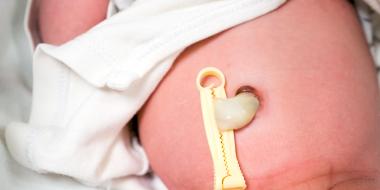When we are pregnant, many things occupy our minds — from how we will get through childbirth, to what life at home with baby will be like, to how much larger can our breasts possibly get! What we often don’t think much about are the first 48 hours after baby’s arrival. Being prepared for this amazing and tumultuous time can help you ease into parenthood more smoothly.
Day one: birthday
Let’s start with the first minutes after birth. Very often we’re led to believe that as soon as the baby is born, violins will play, angels will sing, and we will fall madly in love with our bundle and cry tears of unmitigated joy. For many, this is at least partly the truth. But it's not the whole case for everyone.
Skin-to-skin contact
With the best of intentions, brand spankin’ newborns are often placed directly onto new mothers with enthusiastic cries of, “Take your baby!” to initiate critical skin-to-skin bonding. For some women, this is one of their favourite memories of birth. For others, it is a shock. Some women need time and quiet to come back from such an intense journey. Having space to breathe themselves back into their bodies, letting them claim their babies in their own good time, can be important for optimal bonding.
I have heard a lot of moms express feelings of shock and unpreparedness for the connected presence with their babies just seconds after birth. Some have felt guilt about this ambivalence, as if they were somehow lacking. Know this: you are an awesome mom whether it took two seconds, two minutes, or two hours to feel ready to meet your new little one. It is normal to need some time.
Staying in touch…with the moment
It is also normal to feel worried about your new baby when she arrives. But instead of getting caught up in thinking worried thoughts immediately after the baby is born, such as, “What are the APGARs,” or “Am I bleeding? Did I tear?” try to kick back and relax. Whatever may be going on with you or baby, your care provider will inform you as things unfold. They will not withhold concerns from you. If the tone of the room seems calm, generally all is well, and you can just let your worries go. Oxytocin is the hormone which promotes bonding and contracts your uterus to prevent bleeding. It tends to flow better when your mind and body are relaxed.
Since the advent of personal mobile devices and social media, a lot more people are reaching out in the precious moments following birth to notify the world of the new arrival instead of living it as fully as possible in real time. There will be plenty of time to share baby. You never get these moments back, so savour them. Think about sharing the news with others after you’ve had time to revel in those little fingers and toes, after baby has had some quality time at the breast, and after you’ve had a snack. Or, if instant sharing is important to you, delegate social media duties to a friend and focus where you’re really needed.
First fling with breastfeeding
Whether you gave birth vaginally or by C-section, at some point your baby will show interest and you will be ready (if this is your plan) to give breastfeeding a try. You may have even taken breastfeeding classes in preparation. But here’s the thing: babies are so much squirmier than the dolls they had you hold in class! Your first few feeds will likely feel very awkward.
You may be tempted to sit up for greater ease of vision. Remember, though, that the part of you that just birthed a baby, either your bottom and perineal area or your lower abdomen, will be tender. Sitting up can put pressure on these sore spots. I highly recommend the “biological nurturing” position, which has you lying comfortably back, with your baby lying between your breasts to either “crawl” to your breast and latch himself, or curled in the crook of your arm (with a pillow supporting it) so he is already in the vicinity of your breast when he starts smacking his lips.
If baby hasn’t latched on within the first 30 to 60 minutes, squeeze some drops of colostrum out of your breasts and rub it on his lips. His tummy is literally the size of a cherry pit, so he doesn’t need much. Keep trying as he shows interest, and trust that while it all seems very new and overwhelming, you’re both usually designed to do this. Ask a nurse, midwife, or doula to help if you want.
Be patient with yourself and your baby. You are both learning how to do this! If you are experiencing problems or pain, contact a breastfeeding support person as soon as possible.
Uh oh…gotta go!
After a vaginal birth, your perineal area will be very tender and the idea of using the bathroom can be daunting. Take a squeeze bottle filled with warm water. Squirt yourself gently (aim for your urethra) while sitting on the toilet before you begin urinating. Continue squeezing warm water onto yourself while you pee, and after for cleaning. The warm water helps to dilute the urine so it doesn’t sting delicate tissue.
In both Cesarean and vaginal birth, the idea of moving one’s bowels afterwards can be downright terrifying because of tenderness in your bottom or your belly. If you’re on narcotic pain medication, this can cause constipation, making matters feel even scarier. You will likely be offered a stool softener. Ensuring you eat foods that are warm, nourishing, hydrating, and high in good fats can keep everything moving smoothly. Drink lots of room temperature to warm water. Don’t strain! If you’ve birthed surgically, keeping a pillow over your tummy and exerting a small amount of compression can be comforting.
Day two…or is it night?
Babies are so cute, and often appear quite mellow in the first 24 hours of life, eating a minimum of eight times per day. But night two may be a different story!
Let sleep slip in
Within the first couple of days, you may find it more difficult to sleep than you expect. Birth is a big deal, and the adrenaline coursing through your body may make you feel jangled. If you gave birth at a hospital, well-meaning but frequent interruptions can make it hard to settle and rest.
Keeping your baby skin-to-skin with you as much as possible and breastfeeding can help you to feel sleepy. With a partner or loved one gently keeping an eye on both of you, feel free to drift off deliciously if you can. A sleep belt can ensure you feel secure knowing your baby won’t slide off you if you both fall asleep. Quiet and TLC are what you deserve right now. Unless it makes you feel reassured and happy, keep visitors to a minimum.
Feeding frenzy
In a mad struggle to get his milk supply in, your little one may seem to only want to be at your breast, suck angrily, yell, fall asleep, then protest loudly when you try to put him down. Please know this is normal, that he is not starving or anywhere near needing supplementation. Warm skin and the familiar sound of a heartbeat (yours or your partner’s) will keep him calmer, helping him burn fewer calories. The closeness also produces milk-producing hormones. You are not doing anything wrong because he is fussing.
Mental health and hormonal shenanigans
Within a couple of days after birth, your hormone levels shift radically. You may feel hot flashes, sweat, and have to pee like crazy. For those who are sensitive, these hormonal shenanigans can cause some feelings of jitteriness. All good, as long as you feel well otherwise, and these feelings usually pass.
If you feel emotionally strange or unwell, please don’t hesitate to let your care provider know. This is not your fault or a sign you’re not cut out for parenting. Perinatal anxiety and depression related concerns are the most common complications of childbirth, and nothing to feel ashamed about! The great news is these things are absolutely treatable. With help and support, you will be well.
Enjoy the slow ride while you can
Those first hours and days of being enraptured by your sweet little love are what bonding is all about. Whenever possible, be fed and be nurtured while you feed and nurture. Breathe. Feel. Take it slow while you can. It's sometimes a crazy ride.
May you look back upon these first 48 hours, even if things don’t go as expected, with pride in yourself for all you have done to bring this child into the world. Even if it’s a bumpy ride, you have what it takes, and as everyone adjusts, it will go more smoothly. You’ve got this!






